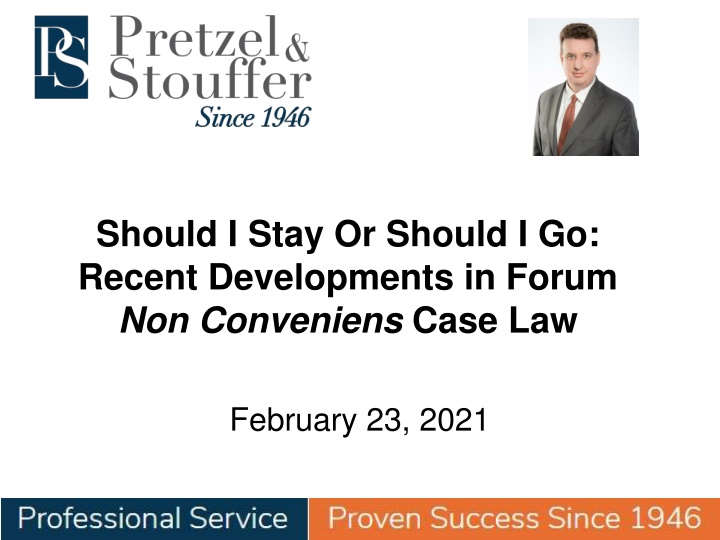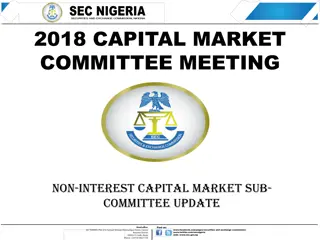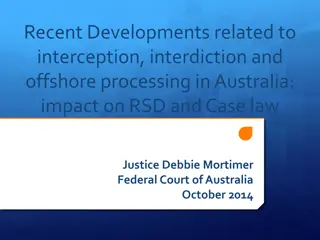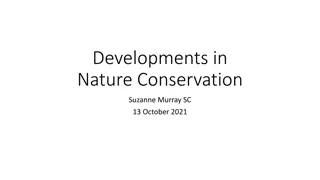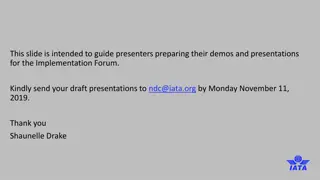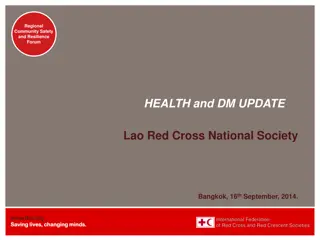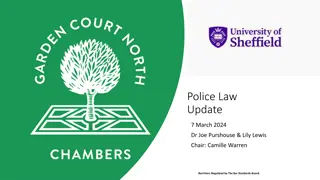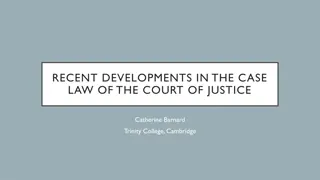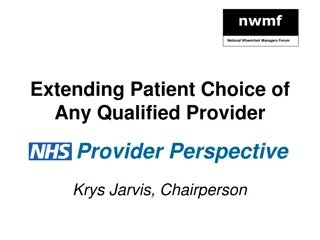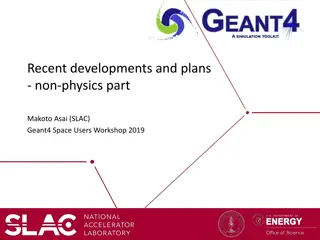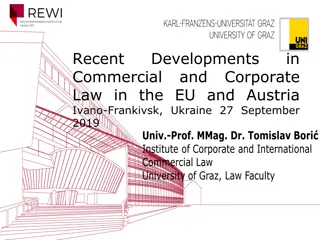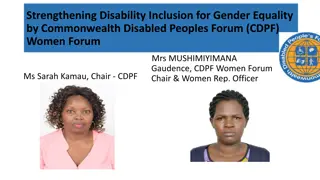Recent Developments in Forum Non Conveniens Case Law
Forum non conveniens is an equitable doctrine allowing a court to decline jurisdiction for a trial in a more suitable forum for justice. The plaintiff's choice of forum is crucial, with the burden on the defendant to justify a change. The court assesses various private and public interest factors to determine the appropriate forum for a trial.
Download Presentation

Please find below an Image/Link to download the presentation.
The content on the website is provided AS IS for your information and personal use only. It may not be sold, licensed, or shared on other websites without obtaining consent from the author.If you encounter any issues during the download, it is possible that the publisher has removed the file from their server.
You are allowed to download the files provided on this website for personal or commercial use, subject to the condition that they are used lawfully. All files are the property of their respective owners.
The content on the website is provided AS IS for your information and personal use only. It may not be sold, licensed, or shared on other websites without obtaining consent from the author.
E N D
Presentation Transcript
Should I Stay Or Should I Go: Recent Developments in Forum Non Conveniens Case Law February 23, 2021
Forum Non Conveniens Basics Forum non conveniens is an equitable doctrine that is founded in considerations of fundamental fairness and sensible and effective judicial administration. Vinson v. Allstate, 144 Ill.2d 306, 310 (1991). It is governed by Supreme Court Rule 187. A forum non conveniens motion presumes that statutory venue is proper. The Court is afforded considerable discretion in ruling on a forum non conveniens motion. Ruch v. Padgett, 2015 IL App (1st) 142972, 38.
Forum Non Conveniens Basics This doctrine allows a trial court to decline jurisdiction when trial in another forum would better serve the ends of justice. Langenhorst v. Norfolk Southern Ry., 219 Ill.2d 430, 441 (2006). A dismissal based on forum non conveniens can be between forums in different states - interstate - or between forums within the same state - intrastate. Ruch, 2015 ILApp (1st) at 37.
Forum Non Conveniens Basics The doctrine affords courts discretionary power that should be exercised only in exceptional circumstances when the interests of justice require a trial in a more convenient forum. Langenhorst, 219 Ill.2d at 443. The plaintiff has a substantial interest in choosing the forum where his rights will be vindicated, and the plaintiffs forum choice should rarely be disturbed unless the other factors strongly favor transfer. Id. at 443. The burden is on the defendant to show that relevant private and public interest factors stronglyfavor the defendant's choice of forum to warrant disturbing plaintiff s choice. Id. at 444.
Forum Non Conveniens Basics A plaintiff s choice of forum is entitled to substantial deference. The plaintiff has a substantial interest in choosing the forum where his rights will be vindicated, and the plaintiffs forum choice should rarely be disturbed unless the other factors strongly favor transfer. Langenhorst, 219 Ill.2d at 443. [w]hen the plaintiff is foreign to the forum chosen and the action that gives rise to the litigation did not occur in the chosen forum, this assumption [of convenience] is no longer reasonable. Instead, it is reasonable to conclude that the plaintiff engaged in forum shopping to suit his individual interests, a strategy contrary to the purposes behind the venue rules. Dawdy v. Union Pacific R.R. Co., 207 Ill.2d 167, 174 (2003).
Forum Non Conveniens Basics In deciding a motion based on forum non conveniens, the court must balance certain private and public interests in determining the appropriate forum in which the case should be tried. Dawdy, 207 Ill.2d at 172. The court considers all relevant factors in making its determination. Langenhorst, 219 Ill.2d at 444. The doctrine of forum non conveniens requires the evaluation of the total circumstances rather than concentration on any single factor. Lambert v. Goodyear Tire & Rubber Co., 332 Ill. App. 3d 373, 378 (1st Dist. 2002).
Forum Non Conveniens Basics Private interest factors include: (1) the convenience of the parties; (2) the relative ease of access to sources of testimonial, documentary, and real evidence; and (3) all other practical problems that make trial of a case easy, expeditious, and inexpensive. Langenhorst, 219 Ill.2d 430, 443 (2006) (quoting First Nat 'I Bank v. Guerine, 198 Ill.2d 511,516 (2002)).
Forum Non Conveniens Basics Public interest factors include: (1) the interest in deciding controversies locally; (2) the unfairness of imposing trial expense and the burden of jury duty on residents of a forum that has little connection to the litigation; and (3) the administrative difficulties presented by adding litigation to already congested court dockets. Id. at 443-44.
Forum Non Conveniens Basics Subsequent treating physicians is not to be given undue weight, given the obvious incentive it would create for potential plaintiffs to seek care in the forum they would prefer their case to be tried. Bland v. Norfolk & Western Railway Co., 116 Ill.2d 217, 226-227 (1987). Affidavits should be offered in support of motion to transfer in order to establish inconvenience of the chosen forum. Langenhorst, 219 Ill.2d at 450. The Annual Report of the Administrative Office of the Illinois Courts is the proper reference in assessing court congestion. Dawdy, 207 Ill.2d at 181.
Forum Non Conveniens Basics The court congestion factor, alone, is not enough to justify transfer if none of the other relevant factors, individually or collectively, can be said to weigh strongly in favor of transfer. Griffith v. Mitsubishi Aircraft International, Inc., 136 Ill.2d 101 (1990). As elucidated by the Supreme Court, "[c]ourts should be extremely reluctant to dismiss a case from the forum rei gestae merely because that forum's docket has a backlog." Brummett v. Wepfer Marine, Inc., 111 Ill.2d 495, 503 (1986). The supreme court also concluded that [w]hen deciding/forum non conveniens issues, the trial court is in the better position to assess the burdens on its own docket. Langenhorst, 219 Ill. 2d at 451.
Forum Non Conveniens Basics Defendant must supply specific information on the inconvenience of witnesses. Weaver v. Midwest Towing, Inc., 116 Ill.2d 279, 289 (1987). In Schoon v. Hill, 207 Ill. App. 3d 601, 608 (1st Dist. 1991) the court stated: [defendant] did not indicate what the testimony of potential witnesses would be, how their testimony would impact the defense or whether or not their depositions could be used successfully at trial. Significantly, [defendant] did not even provide the names and addresses of its own employees who had knowledge about the case and who would testify at trial. The motion states only a conclusion and does not set out any facts to show that other forums would be more convenient for trial than Cook County. (citations omitted).
Forum Non Conveniens Basics Discovery can be issued related to forum non conveniens pursuant to Supreme Court Rule 187(b). The discovery can include written discovery and depositions. Often times an initial motion is filed that is then supplemented once discovery is completed.
New Planet Energy v. Magee, 2020 IL App (4th) 20043 The Illinois Appellate Court reversed the grant of transfer finding that the defendants had not timely moved to transfer. Rule 187, which governs forum non conveniens motions in Illinois, provides that a motion to transfer on that basis must be filed not later than 90 days after the last day allowed for the filing of that party's answer. So, an extension of time to answer is allowed that could extend when the 90 days begins. While Rule 183, which governs extensions of any time period in Illinois, might allow an extension of the 90 days provided for in Rule 187, it is likely best to file the motion within 90 days. If discovery is required, as it was in this case, then the discovery should be issued after the motion is filed based upon what it known to that point, and then supplemented later once the discovery is responded to.
Buss v. Ford Motor Company, 2020 IL App (4th) 190386 The Illinois Appellate Court, Fourth District, in an unpublished decision affirmed the dismissal in a case in which the plaintiff filed a seven count complaint against Ford and a dealer in Cook County. The defendants moved to transfer under forum non conveniens to either Kane or Livingston County and the court transferred to Livingston. The plaintiff refiled her complaint in Kane and after some proceedings there, the court granted another motion to transfer, this time to Livingston County.
Buss v. Ford Motor Company, 2020 IL App (4th) 190386 Once the merits were to be reached, the defendants moved to dismiss, arguing that the matter had to be arbitrated under the purchase agreement and applicable law. The trial court granted the motion and the appellate court affirmed. The court found that the defendants did not waive their right to arbitration by challenging the plaintiff's chosen forum as inconvenient. The court also found it proper that the defendants moved to dismiss and not move to compel arbitration.
Shaw v. Haas, 2019 IL App (5th) 180588 The court held that the trial court abused its discretion in denying a motion to transfer based upon forum non coveniens and ordered transfer of the case from St. Clair to Monroe County because the factors strongly favored transfer and the transfer would serve the ends of justice. The plaintiff claimed injury when an employee of a grocery store allegedly struck her with line of shopping carts. The incident occurred in Monroe County and the employee resided there.
Shaw v. Haas, 2019 IL App (5th) 180588 The Court found that the plaintiff engaged in forum shopping because, though the grocery chain had operations in St. Clair County, the incident in this case did not occur there and she did not live there resulting in her choice of forum being entitled to less deference than usually accorded. The Court decided to transfer the case though the plaintiff received medical treatment in St. Clair County stating that such treatment is not " at the heart of the issue in cases not involving medical malpractice. From a procedural perspective, it is important to note that the Court took judicial notice of distances and travel times to determine relative convenience from Google Maps.
Brandt v. Sedkar, 2020 IL App (5th) 190137 The Court reversed the trial court s denial finding that the trial court abused its discretion in finding that St. Clair County was a proper forum as the only connection was the residence of one of the defendant doctors and the location of plaintiff scounsel s office. While the doctor s residence made venue proper in St. Clair County because his residence had no connection to the alleged medical malpractice at issue. A dissent was filed in which it was argued that the trial court did not abuse his discretion and thus the majority lower[ed] our standard of review in order to reverse.
Hansen-Runge v. Illinois Central Railroad, 2020 IL App (1st) 190383 The Court reversed the denial of a forum non conveniens motion in a case in which an Iowa resident, injured in Iowa, and who was treated in Iowa filed his case in Cook County where the defendant is headquartered, but where no identified witnesses are located in Illinois and other witnesses are scattered in noncontiguous states.
Hansen-Runge v. Illinois Central Railroad, 2020 IL App (1st) 190383 The court first found that less deference was owed plaintiff s choice of forum because he did not live in Cook County and did not ever work there. The record was also significantly underdeveloped as neither party pointed to congestion of either Cook County or the alternative forum. The plaintiff s reliance on the headquarters of the defendant being in Cook County was rejected because the record was not developed on this point and was not raised until the appeal.
Kuhn v. Nicol, 2020 IL App (5th) 190225 The court held that the case should be transferred from St. Clair to Clinton County because the alleged malpractice occurred there and is where the plaintiff resided. Following Bland v. Norfolk & Western, the court did not give "undue weight" to location of subsequent treating physicians.
Evans v. St. Joseph, 2020 IL App (5th) 190414 The court upheld the denial of the motion seeking transfer from St. Clair to Clinton County because the witnesses were scattered between Clinton and Madison Counties and St. Louis, MO and Madison and St. Louis are closer to St. Clair County. It is also important that the co-defendants, located in St. Louis, did not move or aver that trial in St. Clair would be inconvenient for them. In addition, some of the defendants provide care in St. Clair, though it does not seem care was provided to plaintiff in St. Clair.
Kearns v. Presence Central, 2020 IL App (1st) 191470-U The court transferred a case from Cook County to Champaign County, where the alleged negligence occurred and stated: "the plaintiff has identified at least 15 witnesses who live and work in Champaign County ... as opposed to the 10 Cook County witnesses. By identifying these providers, the plaintiff has highlighted the fact that this case has a stronger connection to Champaign County ... as opposed to Cook County ... While we note that the documentary evidence in this case is electronic and, therefore, portable to either county, we find compelling the fact that the majority of the defendants who treated the decedent live, work, or live and work in or near Champaign County and have averred in their affidavits that trial in Champaign County would be more convenient."
Evans v. Patel, 2020 IL App (1st) 200528 The Illinois Appellate Court, First District upheld the denial of a motion in a case in which the treatment occurred in Lake County, but two of the defendants had connections to Cook County and performed other, non-related medical treatment, in that county. The court distinguished Bruce v. Atadero, 405 Ill. App. 3d 318 (2010) and Bland v. Norfolk & Western Railway Co., 116 Ill.2d 217 (1987), two defense counsel favorites, and seemed to conclude that while the question of where the case should be tried was closer than the decision reached by the trial court, the standard of review was abuse of discretion and the factors did not strongly favor transfer. The concurrence emphasized the standard of review and took judicial notice of the proximity of the counties and the non-rush hour distances between the courthouses.
Pratt v. ADM, 2020 IL App (4th) 190476-U The Illinois Appellate Court, Fourth District affirmed the order of the trial court transferring the case from Sangamon County to Adams County. The plaintiff argued that because ADM failed to provide affidavits of witnesses as to the inconvenience of traveling to plaintiff's chosen forum the motion could not be granted.
Pratt v. ADM, 2020 IL App (4th) 190476-U The court stated "Nothing in Langenhorst imposes a requirement that the moving party file affidavits asserting inconvenience to prevail on a motion to transfer. Rather, Langenhorst requires a court to balance the relevant private and public factors, while giving some measure of deference to plaintiff s chosen forum, in determining whether those factors strongly favor transfer. ... Because ADM has identified some witnesses, it is not speculative to consider the inconvenience to the witnesses without requiring affidavits asserting their unwillingness to travel.
Sipula v. Stockley, 2020 IL App (3d) 190214-U The court held that case was properly transferred by the trial court to New Mexico pursuant to the doctrine of forum non conveniens. The plaintiffs, who were residents of LaSalle County, filed suit against an Illinois defendants arising out of an accident that occurred in New Mexico.
Sipula v. Stockley, 2020 IL App (3d) 190214-U The court stated: "The trial court also properly weighed the private interest factors and found that the majority of them weighed in favor of defendant because (1) all of the occurrence witnesses, medical personnel and police officers are located in New Mexico, while only two potential witnesses live in Illinois; (2) the New Mexico witnesses would not be amenable to service in Illinois, and the cost to have them travel to Illinois would be great; (3) the possibility of viewing the scene of the accident is only available in New Mexico; and (4) additional claims may be brought against defendant in New Mexico ... We also agree that the potential applicability of New Mexico law in this case is an important, though not dispositive, factor favoring defendant."
Patrick Eckler 312-578-7653 deckler@pretzel- stouffer.com
